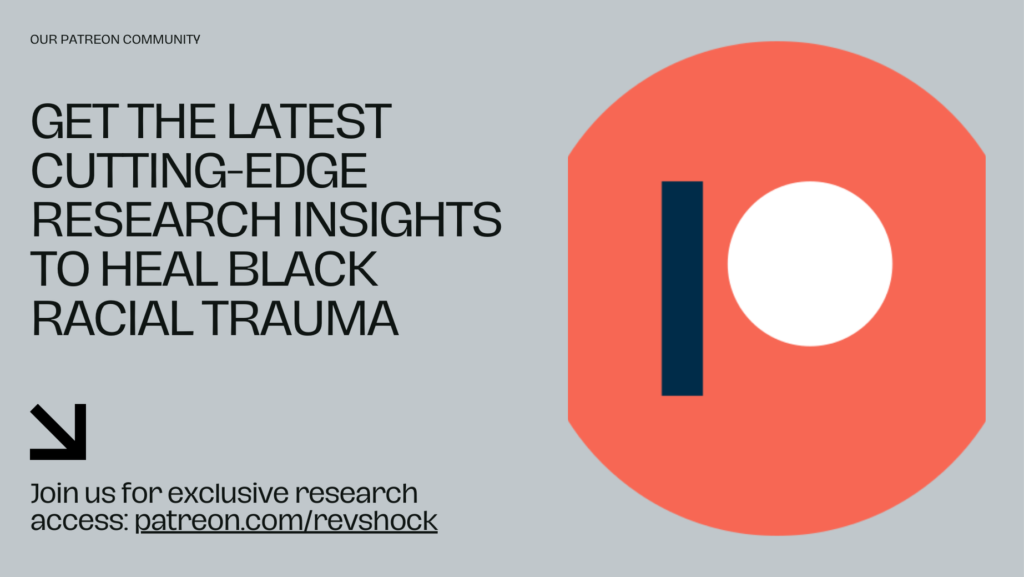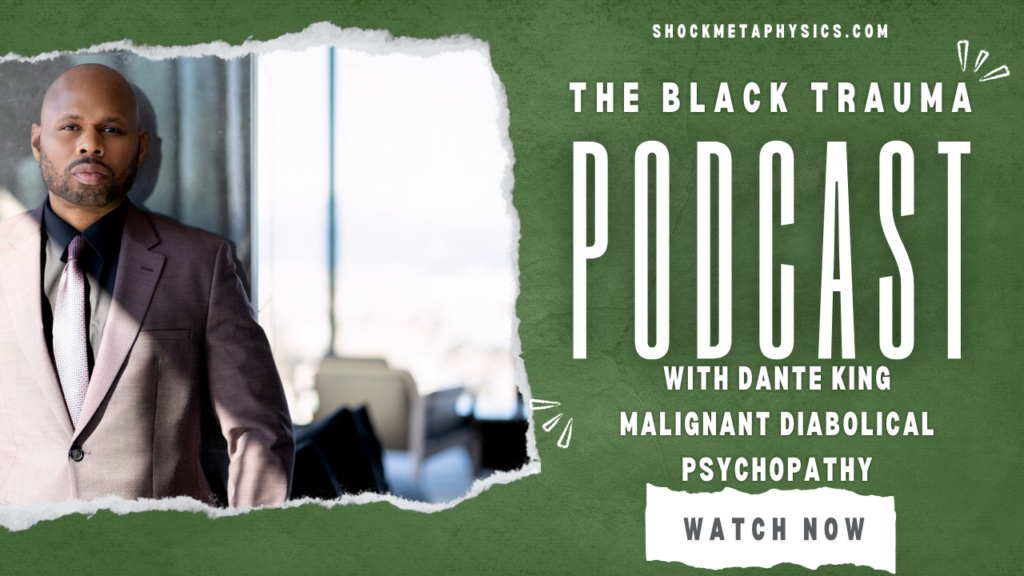
Powered By BlackTraumaGPT.com
Researched and Curated By Rev. Dr. Philippe SHOCK Matthews
(Black Trauma and Mental Health Specialist | Prompt Eng | GPT Dev | Research Scientist | Africana Phenomenologist | Black AI Corsortim co-Founder | Black Mental Health Podcast Host)
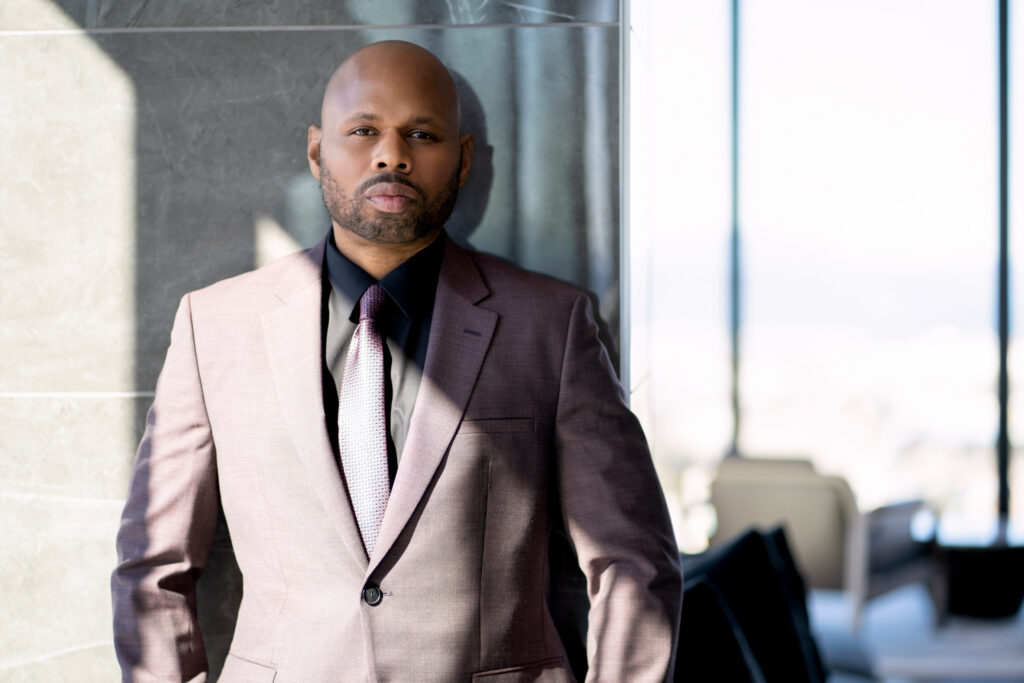
In a groundbreaking interview with Rev. Dr. Philippe Shock Matthews, scholar and legal expert Dante King shared profound insights into white supremacy’s psychological and institutional foundations in America. His work, exceptionally detailed in his books “The 400-Year Holocaust” and “Diagnosing Whiteness and Anti-Blackness,” offers a clinical examination of how racism and anti-Blackness became deeply embedded in American society.
The Origins of Anti-Blackness
King’s research reveals how anti-Black racism was systematically constructed through legal, academic, and cultural mechanisms. Through extensive study of historical legal documents, he discovered laws that specifically targeted Black people—not just enslaved individuals—during the antebellum period. This finding demonstrates that America was founded on anti-Blackness as a core principle, not merely as an economic system of slavery.
“I found laws that specifically targeted blacks during the antebellum period,” King explains. “These laws highlight black, and they also highlight the condition or category of slaves… That means that these laws are not implicitly only directed at slaves or explicitly directed at people who are enslaved of the slave condition, but that they’re aimed at black people.”
The Psychological Impact
One of King’s most compelling arguments centers on what he terms “malignant diabolical psychopathy.” This concept, developed in collaboration with behavioral health experts, describes the systematic implementation of evil across an entire population. The term encompasses not just individual acts of racism but the cultural and institutional framework that normalizes and perpetuates anti-Black violence and discrimination.
King points to historical court cases that reveal this psychopathy in action. For instance, he cites multiple Supreme Court rulings where judges claimed Black men were inherently rapists because of their Blackness while simultaneously ruling that Black women could not be victims of rape due to their supposed inherent immorality. These legal precedents helped construct and reinforce dehumanizing stereotypes that persist today.
The Economic Engine of Racism
A crucial aspect of King’s analysis is how racism has been economically incentivized throughout American history. From the prison industrial complex to special education programs that disproportionately target Black children, systems of oppression create jobs and generate revenue. As King notes, “People are employed to manage the oppression of black and brown people. Every day we are employed to manage our oppression.”
This economic dimension helps explain why racist systems persist even as overt racist attitudes become less socially acceptable. The financial incentives built into these systems ensure their continuation regardless of individual beliefs or intentions.
Collective Psychosis and Cultural Programming
One of the most devastating effects of white supremacy, according to King, is how it has created a “collective cultural psychosis” affecting both white and Black Americans. For Black Americans, this manifests as an inability to know themselves outside the context of white racial control and cultural domination.
“We’ve never had access to a thought process, to a cultural orientation, to a psychological orientation of blackness without the influence and presence of white people,” King explains. This has led to what he calls “white people derangement syndrome,” where Black people have internalized white supremacist values and use them to judge themselves and each other.
The Role of Education and Miseducation
King emphasizes how educational systems have been used to falsify consciousness and recruit people into accepting society’s criminality. Drawing on the work of Carter G. Woodson and Dr. Amos Wilson, he explains how miseducation maintains systems of oppression by preventing people from recognizing their actual condition.
This systematic miseducation helps explain why many Black people struggle to accept the reality of institutional racism and white supremacy. As King notes, it goes against African axiology—the traditional African value system based on human relationships and community—to conceive of an entire group of people as psychopathic.
Moving Forward: Coping Communities and Psychological Divestment
Rather than focusing on “healing spaces,” King advocates for creating what he calls “coping communities.” He argues that true healing isn’t possible while trauma and oppression are ongoing, but communities can provide mutual support and validation for shared experiences.
King also emphasizes the importance of psychological and emotional divestment from white supremacist value systems. This includes rejecting the tendency to hold Black people to standards that white people aren’t held to and refusing to participate in isolated criticisms of Black behavior that ignore broader systematic contexts.
The Impact of King’s Work
King’s work is already making practical differences in the legal system. His expertise has contributed to implementing California’s Racial Justice Act, which allows defendants to challenge charges they believe are influenced by racial bias. His declaration in the People v. Finley case helped establish new legal precedents for reviewing racially biased prosecutions.
Beyond the legal realm, King’s research and teaching are profoundly affecting those who encounter them. As one colleague noted, his work appears to be “changing the body chemistry of black people” by providing validation and historical context for their experiences of racism.
Looking Ahead
As America enters another contentious political period, King’s work becomes increasingly relevant. He argues that regardless of political outcomes, white supremacy remains the fundamental operating system of American society. Understanding this reality is crucial for both survival and resistance.
King’s message isn’t just for academics or activists. His work, available through his books and a 10-part documentary series, provides essential tools for understanding and coping with America’s racial reality. As Rev. Matthews noted in the interview, this knowledge becomes crucial as social and political tensions escalate.
Conclusion
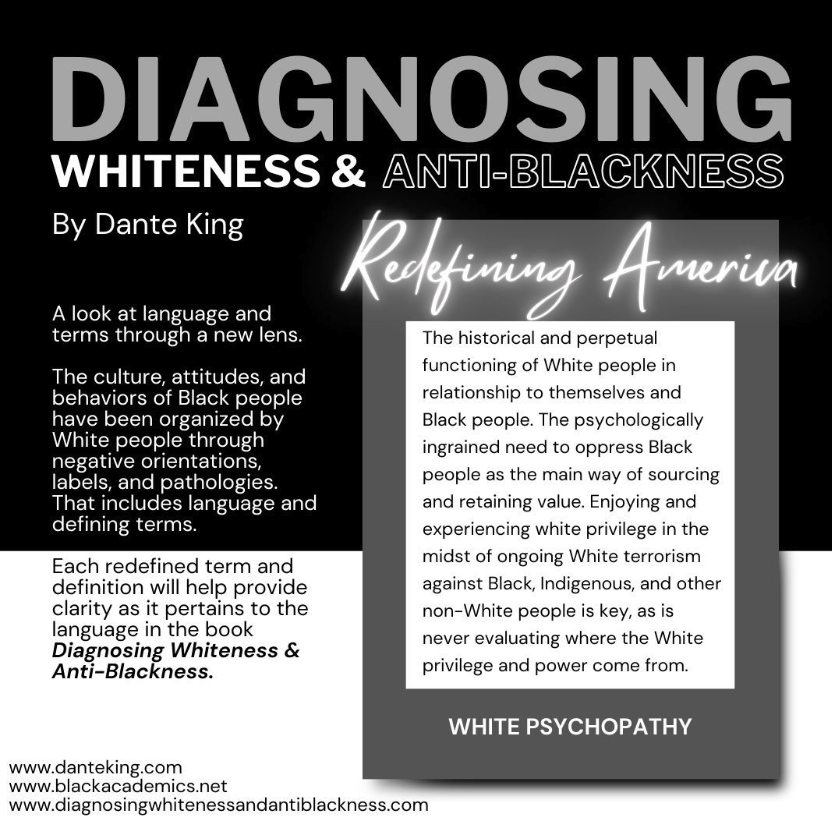
Dante King’s work represents a crucial evolution in our understanding of racism and white supremacy. By combining historical research, legal analysis, and psychological insights, he provides a comprehensive framework for understanding how anti-Blackness became institutionalized in American society and continues to shape our present reality.
His emphasis on coping strategies and community building, rather than individual healing, offers practical paths forward for those grappling with these realities as America continues to struggle with its racial legacy. King’s insights become increasingly valuable for anyone seeking to understand and address systemic racism.
For those interested in exploring these ideas further, King’s books and documentary series are available at diagnosingwhitenessandantiblackness.com. His work serves as both a warning about the depth of America’s racial problems and a guide for those working to address them.
King’s research and teachings offer crucial tools for understanding and responding to America’s ongoing racial crisis. His work reminds us that addressing racism requires more than individual attitude changes—it demands a fundamental rethinking of our social, legal, and economic systems.
———————
Brought To You By…
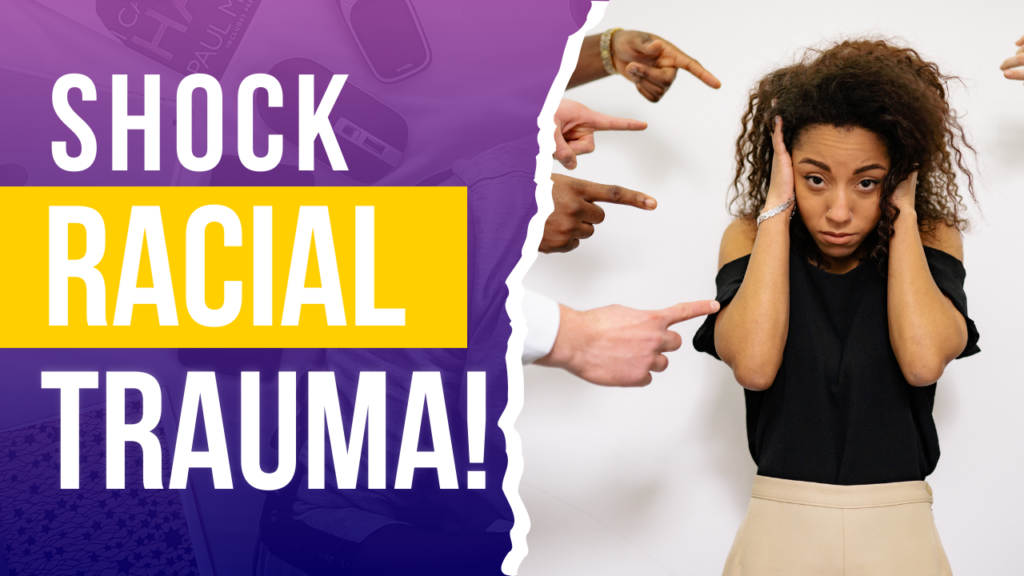
If nothing is wrong with you and something happened to you…are you ready to find out what to do about it? Shock Trauma Spiritual Counseling Discovery Call | BlackTraumaGPT.com: Beginner’s User Guide | Programming chatGPT for Black Self Mental Health, Trauma, and Healing.
May These Words Of Power Inspire You To Greatness!
Nothing Is Wrong With Black People…Something Happened to Black People by The Metaphysical Morpheus
— AVAILABLE ON SPOTIFY, ITUNES & APPLE MUSIC, AMAZON MUSIC and IHEARTRADIO ♫.
———————
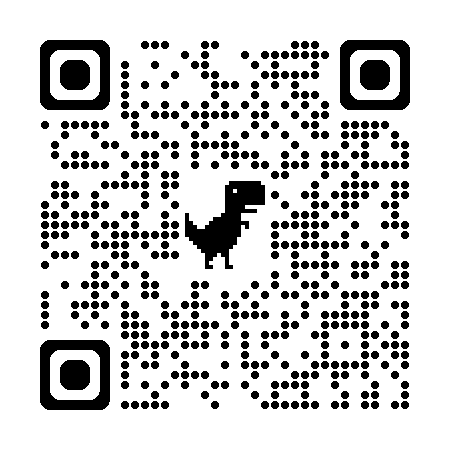
“I just completed a brief session with ChatGPT-Black Trauma. Wow! The responses I got were soooooo helpfu!.” — John Jackson (Patreon Member)
At BlackTraumaGPT.com, we aim to foster healing, understanding, and empowerment within Black communities by providing culturally sensitive education, insights, and mental health resources. We aim to deepen the collective awareness of Black trauma’s historical roots and its contemporary manifestations while guiding individuals and communities toward paths of self-care, resilience, and holistic healing. By leveraging the wisdom of Africana phenomenology and the expertise of Black scholars, we support the transformation of trauma into strength, encouraging collective growth and thriving.
IT’S TIME TO BREAK BLACK TRAUMA! Heal Thyself @ BlackTraumaGPT.com http://blacktraumagpt.com/ ASK THE QUESTION(S)!
———————
Get Social with Doc SHOCK:
PATREON | ABOUT DR. SHOCK | FLY SOLO | ACADEMIC BIO | BLOG | BLACK TRAUMA PODCAST | ENDORSEMENT | THREADS | IG | FB PAGE | PRIVATE GROUP | X | LINKEDIN | TIKTOK | PINTEREST | BLACK TRAUMA GPT | BLACK AI CONSORTIUM | BOOKS BY DOC SHOCK
